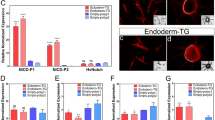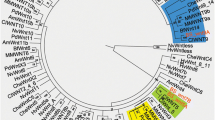Abstract
Differentiation of body column epithelial cells into tentacle epithelial cells in Hydra is accompanied by changes in both cell shape and cell-cell contact. The molecular mechanism by which epithelial cells acquire tentacle cell characteristics is unknown. Here we report that expression of a Hydra homologue of the mammalian IQGAP1 protein is strongly upregulated during tentacle formation. Like mammalian IQGAP, Hydra IQGAP1 contains an N-terminal calponin-homology domain, IQ repeats and a conserved C terminus. In adult polyps a high level of Hydra IQGAP1 mRNA is detected at the basis of tentacles. Consistent with a role in tentacle formation, IQGAP1 expression is activated during head regeneration and budding at a time when tentacles are emerging. The observations support the previous hypothesis that IQGAP proteins are involved in cytoskeletal as well as cell-cell contact rearrangements.
Similar content being viewed by others
Author information
Authors and Affiliations
Additional information
Received: 25 January 2000 / Accepted: 2 May 2000
Rights and permissions
About this article
Cite this article
Venturelli, C., Kuznetsov, S., Salgado, L. et al. An IQGAP-related gene is activated during tentacle formation in the simple metazoan Hydra . Dev Gene Evol 210, 458–463 (2000). https://doi.org/10.1007/s004270000084
Issue Date:
DOI: https://doi.org/10.1007/s004270000084




